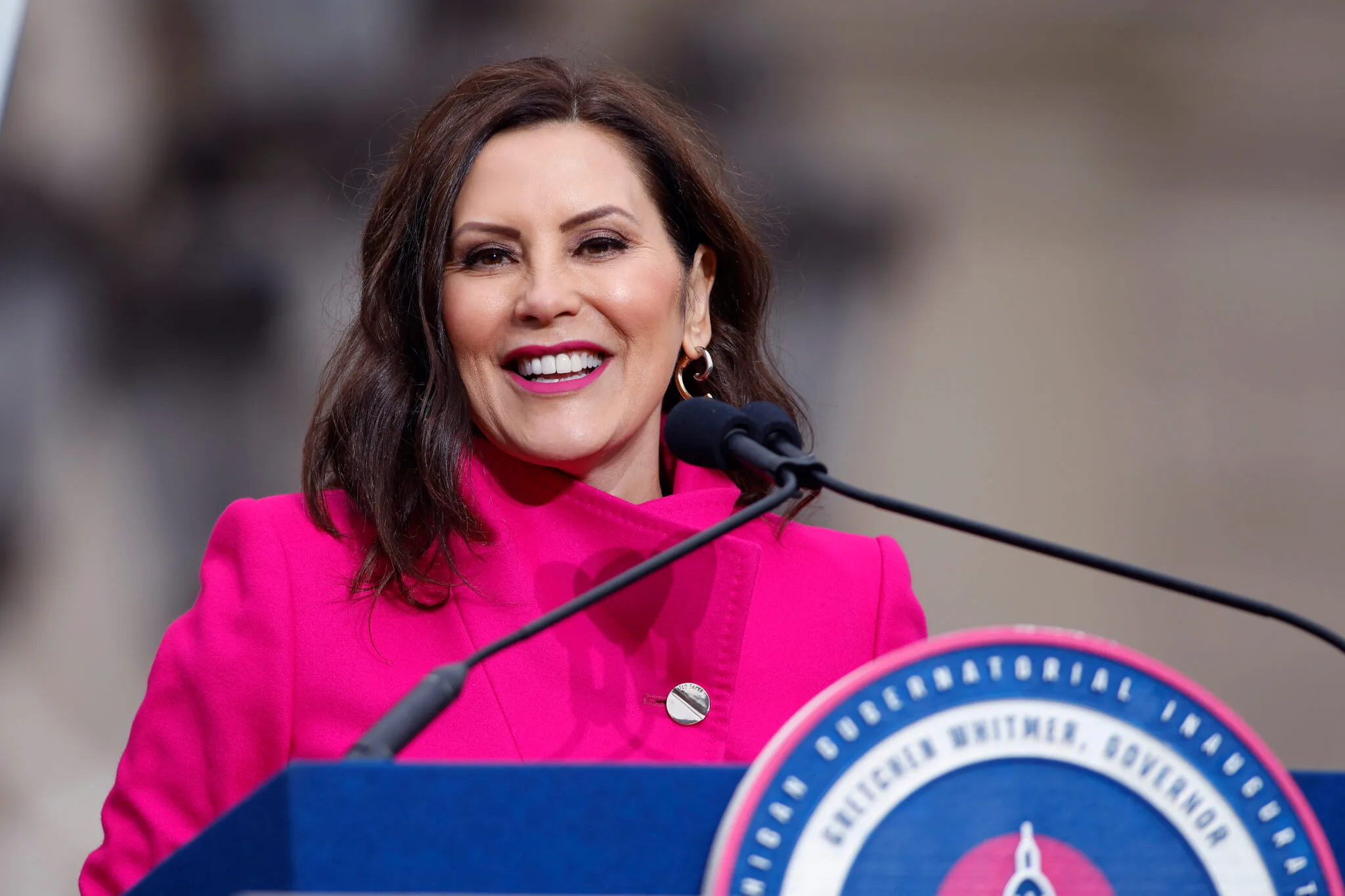
FILE - Michigan Gov. Gretchen Whitmer addresses the crowd during inauguration ceremonies, Jan. 1, 2023, outside the state Capitol in Lansing, Mich. Whitmer will announce a plan Wednesday, Jan. 25, 2023, to provide universal prekindergarten education for all 4-year-olds in Michigan during her State of the State speech, as she aims to deliver on one of her original campaign promises with Democrats now holding full control of the Legislature. (AP Photo/Al Goldis, File)
“We’re talking about women at all stages in life and in all parts of our state.”
– Gov. Gretchen Whitmer
I’m a woman in Michigan, and I had questions.
Over the past few weeks, Governor Gretchen Whitmer has announced big plans for her second term in office. Plans to right wrongs done to Michigan’s seniors and families by a previous administration, and plans to build a stronger future for job seekers and school kids alike. I’ve been in the news business for a long time, and after a while, politicians’ plans all start to sound the same. But one of the things I really like about this governor is her ability to get real.
So when we talked on the phone yesterday, I asked her to get real about two questions that have been on my mind this year. Check out what she said below, listen to clips here, here, here, here, and here, and find out what my favorite line from the interview was at the end of this story.
A Michigan Model? “Oh yeah, that’s a great question.”
In November, voters elected more women to Michigan’s state Legislature than ever before. They also passed Proposal 3, flipped both the House and the Senate for the first time in 40 years, and now have teachers at the helm of every education committee in Lansing. This resounding support for women in state leadership in particular comes at a time when Michigan has a strong budget and the ability to get lasting change done.
Meanwhile, other states are still fighting for reproductive freedom and female representation. Plus, research shows that the COVID-19 pandemic has disproportionately affected women and girls in America. If I were the governor of Michigan, I would be thinking hard about the legacy I could create leading the way for states looking to lift up women.
LH: “So I’m wondering, how do you envision Michigan being a model state for supporting working women?”
GW: “Oh yeah, that’s a great question. At the heart of my work, I’ve been focused on finding solutions to the issues I know Michiganders are confronting. And right now, a top concern I hear from people all across our state is that they need relief.”
Whitmer listed a number of programs and proposals in the works that will help lift up not just working women in Michigan, but women in all stages of life. Such as:
Passing the Working Families Tax Credit
“This would deliver $3,000 savings for 750,000 families across Michigan. The great thing about that, too, is that half the kids in Michigan live in these households. So you’re pulling a lot of people out of poverty by focusing on people who are working hard, raising kids, and can’t get ahead.”
Axing the Retirement Tax
“…to put a thousand dollars back in retirees’ pockets.”
Providing Free Pre-K to All 4-Year-Olds
“…which would also save parents about $10,000 a year.”
Read it again: Michigan voted in favor of public education in the midterms
She added that a lot of the households impacted by those programs are led by women, many of whom could really use the cushion that would come from getting to keep more of their money.
“You know, women who want to get back into the workforce or who are in the workforce but are struggling to make everything work,” she said.
She referenced the Caring For MI Future program, which she launched during her first term as governor. It’s a plan to open 1,000 new free or low-cost childcare programs in Michigan by the end of 2024.
“I think this really builds on the work of my first term, where we expanded childcare to over 150,000 kids,” she said. “We’re now poised, I think, to take the next big step and make it universally available.”
Need to find childcare? Start here.
Whitmer kept going: “I also want to make it easier for women to get higher education and enhance their skills so they can, you know, enhance their paycheck,” she said. “So the Michigan Reconnect and Futures for Front Liners [programs] have put over 100,000 students on a path to higher ed.”
Futures for Front Liners provides free college tuition for essential workers in Michigan, while Michigan Reconnect guarantees free community college tuition for people ages 25 and older. Whitmer said she wants to change that.
“If we can drop the age to 21, thousands more will be eligible and could make use of this,” she said.
I noted that it sounded like her administration was looking for ways to help clear obstacles that many Michigan women worry about. She added that even though Michigan voters passed Prop 3 in November, she wanted to make sure people who needed reproductive care could cross that worry off their list, too.
“I want to just highlight in particular—for women, protecting our right to make our own decisions about our health and our families is an absolutely front and center economic issue,” she said. “I’m proud of the work that we’ve done, but we’ll continue to level other barriers to women being able to make their decisions about their bodies.”
Help Me Help My Community
As a lifelong Michigander, I often tell my teens—not without a hint of warning—that Michigan is one big small town. “Don’t even bother trying to sneak out after bedtime,” I say. “I’ll know about it before you leave the neighborhood.” And while I learned that lesson more than once growing up in both Taylor and Greenville (hey, former Greenville Chief of Police Bruce Schnepp 👋🏼 😬), the communities I grew up in and have raised my own children in have been deeply important to me.
But I worry that the divisiveness that grew from the 2016 election, and which worsened with the COVID-19 pandemic, has hurt the communities that Michigan has long been known for. Since I had her on the phone, I had to ask the governor about it.
LH: “In the State of the State address, you spoke about a lot of plans that could have major impacts on our small towns here. I’m wondering how these plans are going to help Michiganders build stronger communities.”
GW: “Yeah, you know, I agree with you—community is so important. And we’re already getting a lot of work done.”
Whitmer said her plans are focused on giving Michiganders a fair shot at meeting their day-to-day needs, and growing their skills, education, and opportunities if they choose to. That’ll offer more time and energy for us to focus on building our communities.
“So building strong communities starts with great housing opportunities, with preschool, with K-12 education, and continues on to making sure that everyone can have a path to skills that get ’em into a good-paying job.”
Just this week, she said, she made history by being the first Michigan governor since 1947 to—alongside a new Legislature—sign a bill into law in January.
“In this bill we make a $150 million investment in housing and community development, so that we can build or refurbish 2,000 housing units, house 6,000 Michiganders, and create 1,600 good-paying jobs in the process.”
In her State of the State address, Whitmer said that all parents—Republican, Democrat, and Independent—want their kids to have a good life if they choose to stay in Michigan. “Let’s give them reasons to stay beyond the promise of a home-cooked meal or free laundry facilities. Let’s expand economic opportunity and protect fundamental freedoms.”
Whitmer’s administration has also been tackling infrastructure as a generational asset. They made the largest investment ever in Michigan’s state and local parks. They spent more than $4 billion on drinking water, stormwater, and wastewater facilities. And they fixed over 16,000 lane miles of road and 1,200 bridges.
“Ambitious young people have a lot of options when they graduate,” she said in the State of the State. “As they decide where to live, we must make sure Michigan is the answer—not just for a few years but for the rest of their lives—by creating opportunity that lasts for decades.”
She’s got a “60 By 30” goal—getting 60% of Michigan’s population to a skill certificate or college degree by 2030—and is launching the new “Make it in Michigan” program, developing a sustainable funding source for attracting job-makers to Michigan.
In mid-January, Whitmer traveled to Europe to connect with companies that could bring new economic opportunities to Michigan. Since she was first elected in 2018, Michigan has exported a total of $895 million in goods and materials to Switzerland and Norway, and eight projects have been started in Michigan by Swiss and Norwegian companies, for a total capital investment of $39.8 million in our state.
While it can be hard to imagine how a company from Switzerland can help Michiganders build their communities, Whitmer’s strategy seems to be to build up what’s already here—like the first automotive factory in Detroit in 30 years, Gotion’s investment in Big Rapids, and Billerud in Escanaba—in a way that attracts outside interests to the Mitten, ensuring that there will be jobs and a robust economy across the state for generations.
“These are ways we can continue to connect people with opportunities where they are,” she said.
My Favorite Line
Out of everything we talked about yesterday, there was one thing Gov. Whitmer said that really brought both of my questions together. It’s my favorite line from the whole interview.
She said she’s concerned that for too long, too many people in Michigan have felt like “they gotta leave their hometown to find opportunities. We want people to know that they can build a life where they are.”

VIDEO: Trump isn’t the only republican facing charges for alleged financial crimes
https://www.tiktok.com/@gandernewsroom/video/7361494909938978090 A whole lot of Michigan Republicans and lobbyists are facing criminal charges for...

VIDEO: It’s expensive to be poor in Michigan
https://www.tiktok.com/@gandernewsroom/video/7361154790300060974 Ever heard of predatory payday loans? Here’s how new laws could help protect...

Here’s everything you need to know about this month’s Mercury retrograde
Does everything in your life feel a little more chaotic than usual? Or do you feel like misunderstandings are cropping up more frequently than they...

The ’Gander wins multiple 2023 Michigan Press Association awards
MICHIGAN—The ’Gander Newsroom has earned multiple awards in the 2023 Michigan Press Association Better Newspaper Contest. The awards were announced...

Michigan Republicans ask Supreme Court to restrict medication abortion access
A lawsuit supported by Republicans could disrupt access to the most common form of abortion—even in Michigan, where reproductive rights are...




